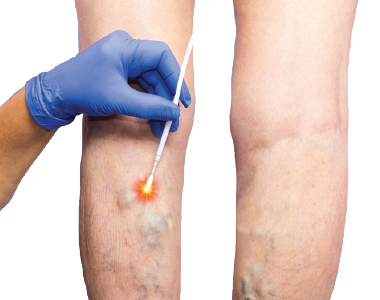Endovenous Ablation for Varicose Veins

Varicose vein is one of the most common venous disease in the legs, affecting 1 out of every 5 adults.
Varicose veins are twisted, swollen veins, which usually appear in the lower legs, but can affect any part of the body. This condition occurs when the valves that direct the blood flow in the veins are weak or damaged, resulting in the decreased blood flow to the heart, and subsequent backing up of blood within the veins, leading to the enlargement of the veins.

How are varicose veins presented in patients?
Varicose veins may be painful for some individuals; they are usually presented as:
- Dark purple or blue coloured veins
- Twisted, bulged, cord-like veins
- Heaviness or aching in the legs
- Muscle cramping, burning, swelling or throbbing in the legs
- Pain gets worse after sitting or standing for a long time
- Itchiness around the veins
- Discoloration of the skin around the veins
How to diagnose Varicose Veins?
Following a physical examination, the doctor may prescribe the following tests to diagnose varicose veins:
- An ultrasound is a non-invasive test, which is performed to check the flow of the blood.
- A venogram involves releasing a special dye into the veins and then taking an X-ray, which provides an overview of the blood flow.
What are the treatment options for varicose veins?
Varicose veins can be treated by certain medications, lifestyle changes and surgical procedures.
The lifestyle changes include:
- Maintaining a healthy body weight
- Exercising regularly to improve blood circulation
- Avoiding standing for prolonged periods of time
- Elevating or raising the legs while sleeping
Using compression socks or stockings can also help treat varicose veins.
Surgical procedures:
Surgery is opted when lifestyle changes are not effective in managing the symptoms of varicose veins. Most surgical procedures, including vein ligation and vein stripping, involve cutting and removing the affected part of the veins.
The other procedures performed to treat Varicose Veins include:
Endovenous ablation therapy, in which radiofrequency or heat radiation is used to block off the vein.
Sclerotherapy, wherein a chemical foam or liquid is injected into the vein that blocks the larger vein.
Microsclerotherapy, wherein a chemical foam or liquid is injected into the block of the smaller veins.
Laser therapy, in which Light Frequency Radiation is used to unblock the blocked vein.
Endoscopic Vein Surgery, in which a small lighted scope is inserted into the vein to block the vein, through a small incision.
What happens before the procedure?
Inform your healthcare provider about:
- Onset and severity of pain and numbness (if any)
- If you have any medical conditions
- Any allergies or intolerances to certain medicines
- Whether you are pregnant or think you may be pregnant
- If you are breastfeeding
- Medicines or supplements that you are taking including, blood thinners, over-the-counter medicines (aspirin or ibuprofen), herbs or vitamins
- If you smoke or drink alcohol on a regular basis
Ask the doctor about:
- What procedure would be best for your case
- The possible outcomes of the treatment
Your healthcare team may give you guidelines for when to stop eating and drinking before the procedure. You may be asked to stop taking aspirin or other blood thinning agents at least one week before the procedure.
What happens during radiofrequency ablation?
Radiofrequency ablation is a procedure which uses radio waves to create heat and block the damaged vein.
The following are the steps involved in radiofrequency ablation procedure:
- You will be asked to lie down on a hospital bed.
- Imaging techniques like ultrasound will be used to guide the procedure.
- The leg to be treated will be injected with a numbing medicine.
- Once the leg is numb, a small hole is made in the vein using a needle.
- The catheter is inserted into the vein.
- When the catheter reaches the right position, it is slowly pulled backwards.
- The catheter emits radio waves, and the vein is closed due to the heat generated.
- Also, the other side branches may be removed or tied.
- Then the catheter is removed, and pressure is applied to the insertion site to stop the bleeding.
The procedure takes about 45 to 60 minutes. You can go home on the same day.
What happens after the procedure?
You may experience pain, swelling, bruising, soreness and change in the colour of the treated area. Individuals treated for vein ligation and stripping may experience severe pain, infection, scarring and blood clots after the procedure. Seek immediate medical attention/care if the condition worsens.
After the procedure:
- Take oral anti-coagulants for 3 months
- Wear grade 2 elastic leg stockings for 3 months
- Reduce weight
Long-term measures:
- Use compression stockings throughout the day to squeeze the leg, thereby easing the blood flow through the veins and the muscles of the leg.
- Elevate the feet while sleeping, which ensures a free back flow of the blood to the heart.
Call your healthcare provider if:
- Fever of 100.4°F (38°C) or higher
- Trouble breathing or chest pain
- Signs of infection at the catheter insertion site, including redness, warmth, inflammation, increasing pain, bad-smelling discharge or bleeding
- Numbness or tingling in the leg
- Severe pain or inflammation
How to prevent the recurrence of varicose veins?
Individuals above fifty years of age are at an increased risk of recurrence of varicose veins within five years of having surgery. However, following a low-salt diet helps to prevent swelling and water retention in the limbs.
After the procedure, you may be asked to restrict doing strenuous activities. But prolonged inactivity may cause the formation of clots and pain. Therefore, following a regular exercise plan, as suggested by your doctor, helps to regain normalcy in the limbs and prevent recurrence of the varicose veins.


